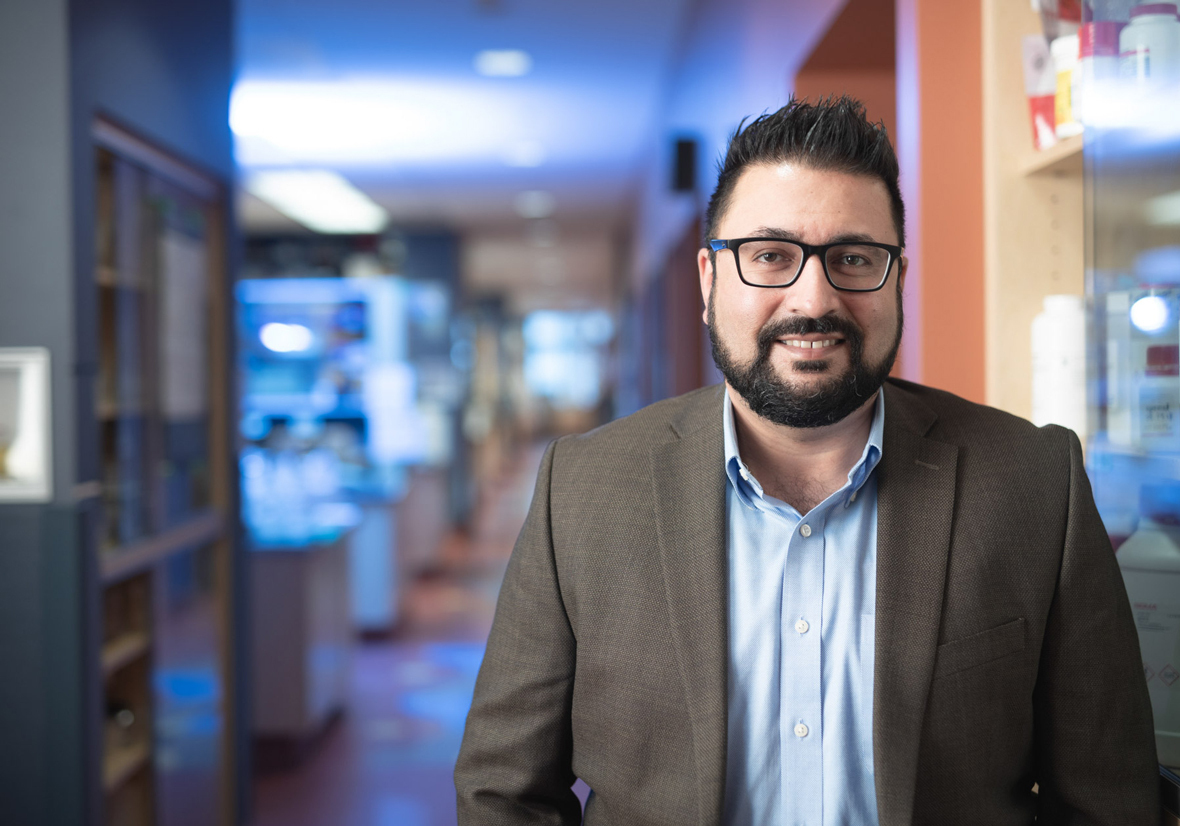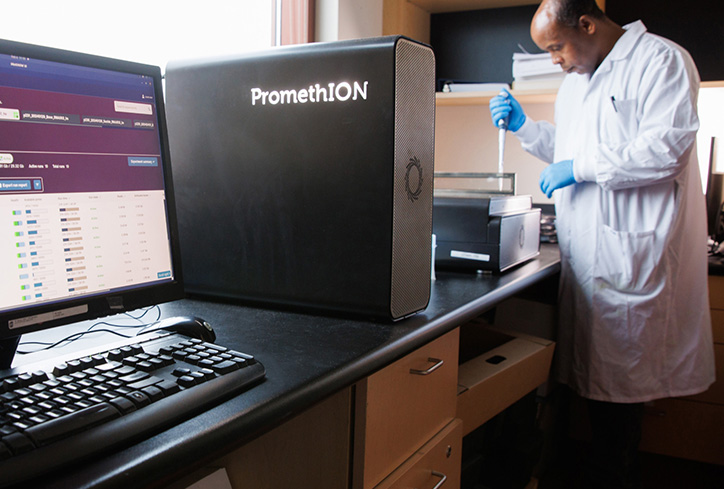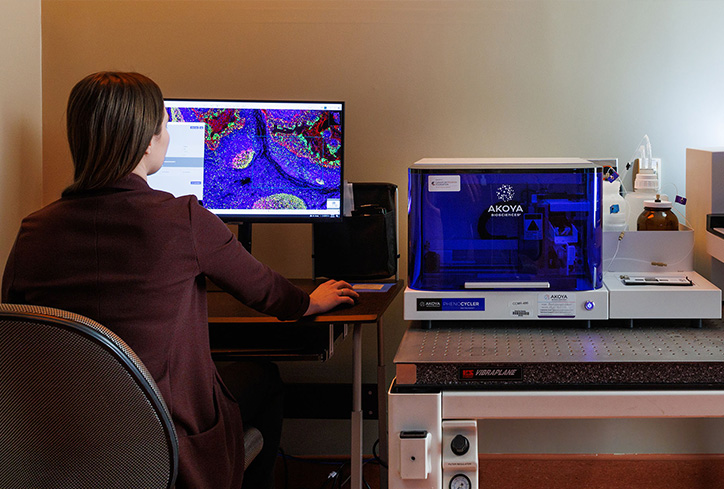Manitoba Tumour Bank
Supporting science with over 100,000 cancer tissue samples
Manitoba Tumour Bank Supporting science with over 100,000 cancer tissue samples The Manitoba Tumour Bank (MTB) is a core biobank facility with an established collection of human cancer-related tissues, other biospecimens and related clinical data. MTB is situated in the Institute and operates within the regulatory approval of the University of Manitoba Research Ethics Board. The bank is certified by and is a founding member of the Canadian Tissue Repository Network (CTRNet), ensuring the quality control of this operation. The bank was established in 1993 initially as a breast tumour bank and expanded its mandate to include additional solid tumours and leukemia in 2006. Today, the current inventory consists of over 21,000 collections on over 11,000 consented patients totalling over 120,000 individual samples. These are representative of chronic lymphocytic leukemia, acute leukemia, breast cancer, prostate cancer, lung cancer, ovarian cancer, multiple myeloma, head and neck cancer, and a small percentage of each of colon cancer, hairy cell leukemia, lymphoma, myelodysplastic syndrome (MDS), as well as healthy control samples. The MTB is operated by a variety of specialists with expertise in patient consent, databasing, tumour processing and storage and tumour cell analysis. Oversight and management of the MTB occurs via fundamental and clinician-scientists who guide, and provide expertise and quality assurance in the accrual, processing and storage of tumour material and its associated clinical data. The different types of biospecimens collected include tumours and associated normal tissue, blood, bone marrow, urine, buccal and ascites. Other services offered are tissue microarray construction, tissue block sectioning, antibody optimization, immunohistochemistry, and scoring. The MTB provides essential support for the acquisition, storage, processing, and distribution of blood and tissue samples. With a well-curated and clinically annotated biobank repository, it provides a critical research service for researchers at the Institute, the University of Manitoba, and across Canada and internationally. The bank has supported hundreds of research studies across North America, Europe and Australia. Since 2015, MTB has directly supported dozens of research projects annually, resulting in several peer reviewed publications and supporting successful investigator and team grant research funding applications.
The different types of biospecimens collected include tumours and associated normal tissue, blood, bone marrow, urine, buccal and ascites. Other services offered are tissue microarray construction, tissue block sectioning, antibody optimization, immunohistochemistry, and scoring. The MTB provides essential support for the acquisition, storage, processing, and distribution of blood and tissue samples. With a well-curated and clinically annotated biobank repository, it provides a critical research service for researchers at the Institute, the University of Manitoba, and across Canada and internationally. The bank has supported hundreds of research studies across North America, Europe and Australia. Since 2015, MTB has directly supported dozens of research projects annually, resulting in several peer reviewed publications and supporting successful investigator and team grant research funding applications.

Stewarding the biobank for future innovation
In 2022, Dr. Sachin Katyal became the Director of the Manitoba Tumour Bank. Informed by his prior experience working in multidisciplinary research teams studying both solid and blood-based cancers, this leadership change harkened a new era within the MTB; evolving from being a service provider to a translational cancer research partner for researchers within Manitoba, Canada, and worldwide. Dr. Katyal is using the MTB as a fulcrum to drive multidisciplinary translational cancer research studies. These include the development of new biobanking initiatives that target disease-sites relevant to Manitoban cancer patients, integration with other Paul Albrechtsen Research Institute CCMB platforms and initiating patient-centric research and tumour profiling studies that will better enable researchers to identify molecular vulnerabilities to enable precision-medicine approaches to treat Manitobans with highly aggressive cancer. These approaches have fostered important collaborations and partnerships with local organizations such as University of Manitoba, WRHA, and Shared Health but also organizations such as the Terry Fox Research Institute, the Canadian Institutes of Health Research, the Canadian Cancer Society, Cancer Research Society and other provincial, national, and international-level funding and cancer research agencies and institutions.

Dr. Leigh Murphy, Past MTB Director – A leader for women in science
Dr. Leigh Murphy has contributed to cancer research in Manitoba through her long and illustrious career as an accomplished scientist at the Institute. She is a Senior Scientist at the Institute and a Distinguished Professor in the Department of Biochemistry and Medical Genetics, at the University of Manitoba. Dr. Murphy’s research is focused on breast cancer and the activity of estrogen receptors (ER) in breast cancer cells, the target of treatment and prevention options in breast cancer. Accurately predicting if and when breast tumours will respond to treatment allows for the development of personalized approaches to cancer diagnosis and treatment to ensure the best possible outcome for breast cancer patients.
Dr. Murphy’s important contributions to breast cancer research led to international collaborations and highlighted the importance of biobanking. This led to the establishment of breast tumour banking and the Manitoba Tumour Bank. Dr. Murphy has been a mentor and leader for women in science and research for many years. In 2022, she retired from her roles at the Institute while continuing to mentor and teach young students at the University of Manitoba.
Research Platforms — Tools of Discovery
The Research Institute provides several core resources, or platforms, to member scientists that enable the advancement of their research. The platforms, detailed below, include specialized technologies, equipment, data, and services. While each platform has important scientific applications on its own, the collective suite enables collaborations and synergies across research disciplines. Thus platform investment decisions are an important strategic function of CancerCare. Funding for the platforms includes the CancerCare Manitoba Foundation, managed research grants, and various funding agencies, universities, and government bodies.





